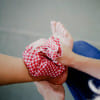Things to remember on your iftar grocery shopping

While the month of Ramadan arrives as a time for salvation and peace for Muslims all over, it also comes bearing with it a month of Ramadan food staples and groceries for better preparation of everyone's favourite iftar items.
We have all experienced discomfort after consuming foods that do not hit the mark in a haste without planning our iftars properly. To avoid such complications, ensure proper nutrition, and stock up on iftar essentials throughout the holy month, we should eat healthy, and easily digestible food.
Below are a few suggestions for your next iftar grocery store trip!
Hydrating foods
During a period of fasting, the consumption of just water is insufficient to meet the caloric requirements of the body, particularly given the impending arrival of warmer days. You should make it a point to incorporate additional items that are high in water content into your iftar shopping list.
You may increase the amount of water you consume after breaking the fast by eating hydrating items such as watermelon after iftar. Similarly, you can opt to make the classic Arabic salad 'fattoush' in iftar with cucumbers and lettuce, both of which help the body retain water.
The nourishing and soothing elements of green tea, rich in natural stimulants, also come into major help after an iftar meal. It not only makes your body feel more refreshed but is also an excellent option for maintaining good skin and preventing constipation.
Healthy snacks and proteins
Put on your iftar shopping list nutritious foods such as almonds, walnuts, dates, puffed rice, and flattened rice as well as sources of protein such as yoghurt, semolina, and milk. You may want to break your fast with some doi chira, muri, or dates.
Doi chira and muri help appease the digestive system and freshen the gut. Furthermore, choose semolina and milk to get a healthy amount of protein after fasting for hours as they help strengthen muscles and bones.
Storing on staples
Prepare for the possibility that you may need to rush through some last-minute cooking to make it in time for iftar by stocking your kitchen with easy-to-prepare items and necessary staples. Some of the foods that you can always keep in your pantry during the month of Ramadan for iftar meals are rice, chickpeas, mustard oil, bread, potatoes, and refreshing powdered drinks. Especially, chickpeas cooked with little amounts of spices in mustard oil help give your palette some taste, and you will find the meal more delicious to consume. It also boosts your energy to stay active after iftar.
Besides, juices or shorbot such as different flavours of TANG, enhance your body with Vitamin A, B, C, and iron and so are an essential part of iftar meals. Do not forget to keep them in mind if you are up for a quick but good iftar!

 For all latest news, follow The Daily Star's Google News channel.
For all latest news, follow The Daily Star's Google News channel. 








Comments